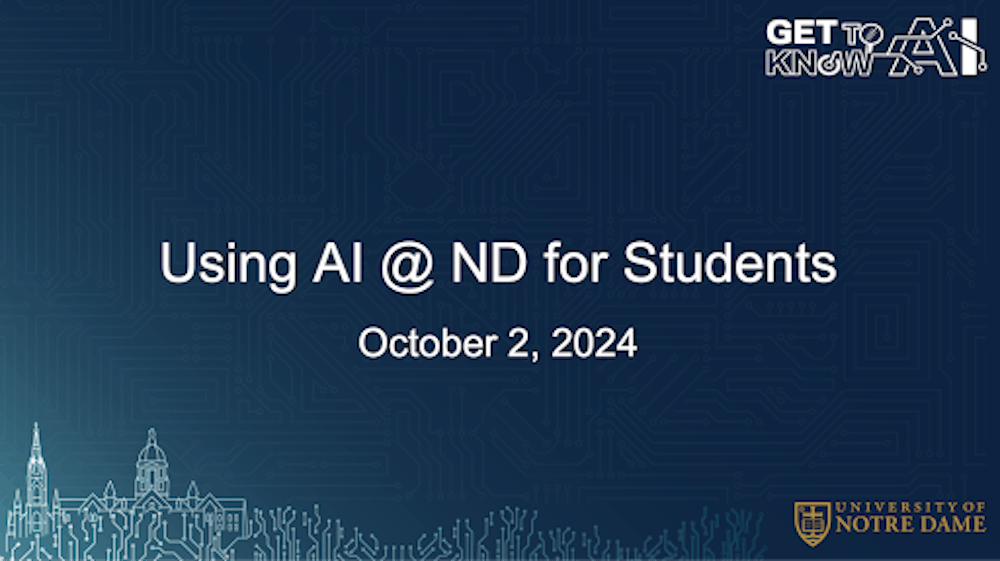Students and faculty gathered in DeBartolo Hall Oct. 2 for a workshop titled “Using AI For Students.”
The event was led by Roberto Cásarez, academic technology and AI literacy specialist, and Ardea Russo, director of the office of academic standards, who oversees honor code and academic integrity initiatives.
Russo and Cásarez both emphasized they want students to feel confident in their use of artificial intelligence and know appropriate boundaries.
“I don't want it to only be thought of as a cheating tool. It's such a valuable resource for all of us for learning,” Russo said. “As long as you're following your professor's directions regarding use of AI for that class, we should all be embracing it.”
Cásarez agreed, promoting AI for the benefits the technology can provide, despite its reputation.
“We have to fight really hard for the good uses of AI. Because right now, the impression is really bad,” Cásarez said.
Russo cited the University's recognition for the use of AI as necessary for all graduates.
“Even if [students] don't use AI in their work every day, they should at least be comfortable and familiar with tools,” Russo stated. “The University recognizes the need to make sure our graduates can do all of those things.”
Their presentation also emphasized the need for students to be responsible in their use of AI by using it for coursework only when permitted, citing and acknowledging AI use as appropriate and asking professors for clarification in cases of uncertainty.
The University honor code states, “representing work that you did not produce as your own, including work generated or materially modified by AI, constitutes academic dishonesty.”
During the session, Russo and Cásarez listed examples that would constitute violations of the honor code, such as prompting AI tools to write thesis statements, solve math problems, write outlines, draft papers and edit essays.
However, students were encouraged, when not prohibited by an instructor, to ask AI tools questions such as “Can you help me understand this math concept, and give me some examples?” and “I’m writing a paper on ‘this topic.’ Can we talk through [how] I might structure it?”
Cásarez and Russo also made sure to clearly draw a line between using AI for personal studying and using it for an assignment.
“You can use [AI] for personal learning if you don't know what a certain topic is,” Cásarez explained. “It becomes different when you have to submit an assignment for a certain class.”
Asking AI tools to create study guides, flashcards or practice questions for studying outside of class were provided as examples of personal learning use. However, students were also warned not to become overly reliant on AI.
“Combine it with your own critical thinking and knowledge,” Cásarez said. “AI is meant to be a supplement to you and to your learning and to your journeys, not as a replacement.”
Graduate student Guangyu Meng said he found the presentation valuable.
“I learned some stuff today … how to write some prompts, or how to use ChatGPT more efficiently,” Meng said.
Even after the presentation, both Cásarez and Russo stated there was much more work to be done, referring to Notre Dame as “middle of the pack" when it comes to speed of adopting and integrating AI tools and resources when compared with peer universities.
However, the University is now taking concrete steps to further develop AI strategies. One of those, Russo said, is the creation of a new advisory body called the “AI Innovation Council." The council will meet for the first time on Oct. 10.
“This group of people, administrators, faculty [and] students from across campus will meet regularly to assess what is needed on campus,” Russo said.
“This is very murky and rough, and we're still trying to figure it out … but we need to figure it out with faculty and students and staff,” Cásarez said.










